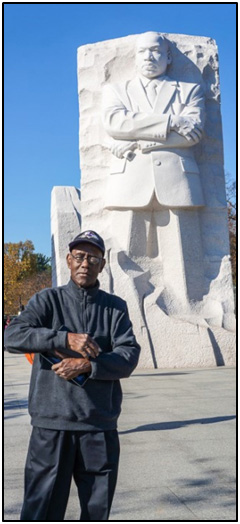Dunbar Brooks Tribute
Dunbar Brooks
 Dunbar Brooks passed this year. During his life, Dunbar wore many hats. But in all his professional and personal pursuits, he remained dedicated to the purpose of improving lives of others. In his career, he worked as a regional planner and a renowned demographer. He taught at Morgan University and Dundalk Community College. One of the primary constants throughout his life was service. He provided leadership in many capacities, including the Turners Station Development Corporation, Franklin Square Medstar, head of Dundalk NAACP, as well as numerous local and state committees. He took great pride in his contributions as a member of the Baltimore County Board of Education and then the Maryland State School Board of Education. He also served as president on those latter bodies.
Dunbar Brooks passed this year. During his life, Dunbar wore many hats. But in all his professional and personal pursuits, he remained dedicated to the purpose of improving lives of others. In his career, he worked as a regional planner and a renowned demographer. He taught at Morgan University and Dundalk Community College. One of the primary constants throughout his life was service. He provided leadership in many capacities, including the Turners Station Development Corporation, Franklin Square Medstar, head of Dundalk NAACP, as well as numerous local and state committees. He took great pride in his contributions as a member of the Baltimore County Board of Education and then the Maryland State School Board of Education. He also served as president on those latter bodies.
Dunbar always had a way putting things in perspective for others. Sometimes the battle for children is tough and the road is long. When working for the benefit of children and to better their education, circumstances can become frustrating, and the obstacles to improving the situation for minority and other students appear almost insurmountable. However, in such instances, Mr. Brooks always provided wise counsel. Once he remarked, “You may not always be right. Being right is often beyond our control. However, you can always try to do right. That never leaves our control.”
Dunbar gave so much of himself to the cause of “people.” He was a father figure far beyond his home. All children were his. As a true humanitarian, he never shirked from his duty to render assistance.
“… When great souls die,
after a period, peace blooms,
slowly and always
irregularly. Spaces fill
with a kind of
soothing electric vibration.
Our senses, restored, never
to be the same, whisper to us.
They existed. They existed.
We can be. Be and be
better. For they existed.”
One of the best ways to honor Dunbar is to bring true meaning to our lives by helping others truly make theirs better. That in itself is a reflection of Dunbar’s life and becomes living testimony and celebration to his life. He truly fulfilled his purpose, and we are all better because he lived and that “He existed!”


